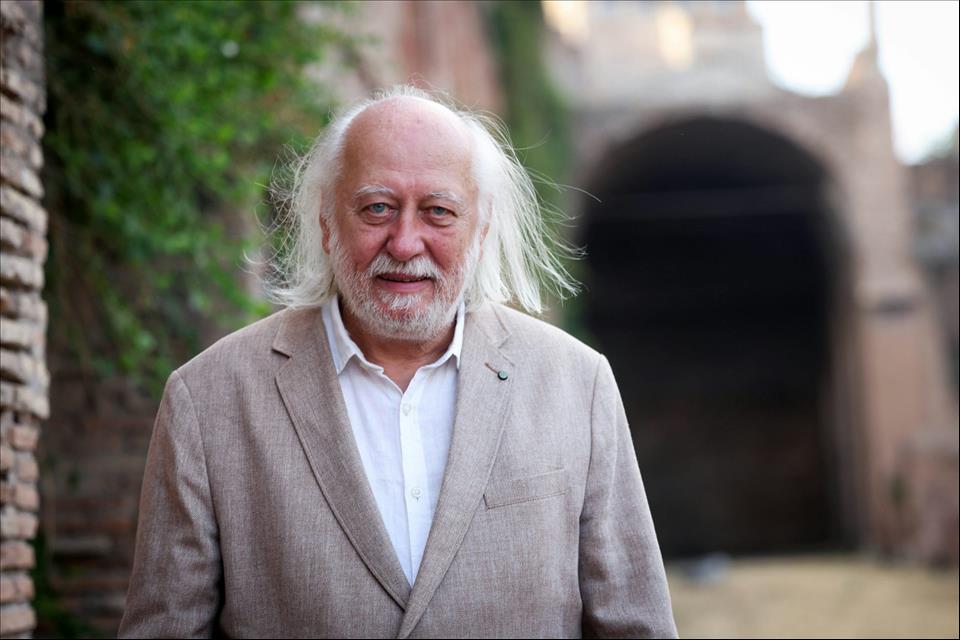
A Great Pessimist And Unapologetic Traditionalist: László Krasznahorkai Wins The 2025 Nobel Prize In Literature
Krasznahorkai is the author of nine novels, numerous collections of short fiction and essays, and several screenplays, including co-writing the epic seven-hour film adaptation of his first book Satantango (1985). He is one of the most distinctive, recognisable writers in the world today.
At the heart of Krasznahorkai's project is the old Beckettian dialectic between pervasive bleakness and ethical despair, and a madly propulsive, inexhaustible engine of language.
His language is the mad scream of a godless universe at our inexcusable squandering of every good thing given to us by chance. The voluble form stirs up the broken content in an irresistible current, flowing from the Big Bang to Paradise – right past our lost world.
His prose is difficult to excerpt. The sentences never end, so even a few quoted words inevitably draw one into the vortex of an all-consuming syntactical storm system. There is no way out once you are drawn in. You find yourself in a stylistic quicksand that is perversely comforting.
Anarcho-capitalist-klepto-nihilismKrasznahorkai's work has frequently been described as“apocalyptic”, and that is accurate enough. But what is the nature of his apocalypse?
Generally, in his great tetralogy – Satantango, The Melancholy of Resistance (1989), War and War (1999) and Baron Wenckheim's Homecoming (2016) – some dark wickedness is approaching. Its signs are the gathering of middle-aged men in public places, strange graffiti, leaflets, an oddly charismatic speaker, and the breakdown of public services – preludes to some major outbreak of destruction and violence.
Members of a putative and ineffectual counterforce are indicated. We chart their mounting concern and anxiety as the inevitable malevolence gains momentum.
One way to think about this is in relation to the breakdown of Eastern European communism and the rise of anarcho-capitalist-klepto-nihilism. This is a perfectly viable lens, but Krasznahorkai also charts the global trend towards far-right“strongman” rule of the kind typified by Hungary's prime minister, Viktor Orbán.
Orbán's veneration by Donald Trump and J.D. Vance, and his similarity to Vladimir Putin, Javier Milei, Benjamin Netanyahu and others of this vicious breed, make his Hungary ground zero for the toxic plume of fascism spreading around the contemporary world.
Krasznahorkai's front-row seat at this theatre of degeneration has made him perhaps the most reliable source of aesthetic information about its spiritual consequences. Orbán's post on the Elon Musk-owned X congratulating Krasznahorkai on his Nobel win is one of the bitter ironies of contemporary history.
Gracious compensationsIf that was all there was, Krasznahorkai's work would be a tough slog indeed – which it is. But it is not without gracious compensations.
Krasznahorkai is an unapologetic traditionalist. He holds to an idea of the arts as our best resource for preventing the slide into barbarism. In an interview earlier this year, he said :
German composer Andreas Werkmeister presides over The Melancholy of Resistance, and Johann Sebastian Bach over Herscht 07769 (2021): models of perfected aesthetic systems capable of transfiguring experience.
Krasznahorkai's marvellous collection Seiobo There Below (2008) heaps precious treasures against the landslide: the paintings of Filipino Lippi and Giovani Bellini , the Amida Buddha statue in the Zengen-ji temple, the Acropolis, the Noh masks of Ito Ryōsuke.
Like Ezra Pound in his Cantos , Krasznahorkai tallies magnificent artistic achievements to serve as necessary, but never sufficient, correctives to the slurry of contemporary culture.
His contributions to world film culture, in three major collaborative“slow cinema” ventures with director Béla Tarr , stand head and shoulders above the standard fare of these past 30 years. They have added considerably to his international reputation.
László Krasznahorkai in 1990. Szilágyi, via Wikimedia Commons , CC BY-SA
Krasznahorkai has been extremely well-served by his dauntless English translators, George Szirtes (who managed the earlier work) and Ottilie Mulzet (who took on the later). Without them, it is doubtful he would have the recognition he does today.
That recognition, having now reached its zenith, has yet to be matched by a comparable understanding of his achievement. Asked about his source of inspiration, Krasznahorkai responded :
It is to be hoped that the Nobel Prize will finally force a reckoning with one of contemporary literature's great pessimists.

Legal Disclaimer:
MENAFN provides the
information “as is” without warranty of any kind. We do not accept
any responsibility or liability for the accuracy, content, images,
videos, licenses, completeness, legality, or reliability of the information
contained in this article. If you have any complaints or copyright
issues related to this article, kindly contact the provider above.
Most popular stories
Market Research

- SPAYZ.Io White Paper Explores Opportunities, Challenges And Ambitions In Payments Industry
- Ceffu Secures Full VASP Operating License From Dubai's VARA
- Cregis And Sumsub Host Web3 Compliance And Trust Summit In Singapore
- Tokenfi And New To The Street Announce National Media Partnership To Reach 219M+ Households
- Chartis Research And Metrika Release Comprehensive Framework For Managing Digital Asset Risk
- Xone Chain Announces Ecosystem Evolution Following Sunflower Letter


















Comments
No comment